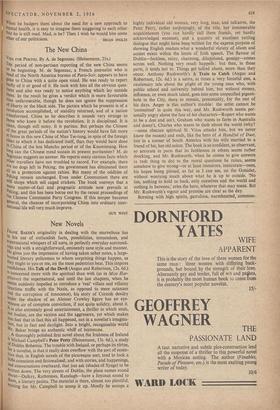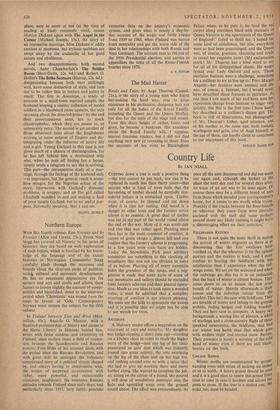New Novels
FRANK BAKER'S originality in dealing with the marvellous lies i0 his use of outlandish facts, possibilities, innuendoes, and suPernatural whispers of all sorts, in perfectly everyday surround- ings and with a straightforward, eminently sane style and manner. He gives you the impression of having taken sober notes, a large- booted literary policeman to whom surprising things happen, as they might to you or me, on the most pedestrian beat. This inspires confidence. His Talk of the Devil (Angus and Robertson, 12s. 6d.) IS concerned more with the spiritual than with (as in Miss Har- greaves) the supernatural, and until the last chapters, when he s"ins suddenly impelled to introduce a `real' villain and villainy (Wartime traffic with the Nazis, as opposed to mere satanism and the corruption of innocence), his story of Cornish devilry ender the shadow of an Aleister Crowley figure has an eye-
Witness air of complete conviction, if not quite solidity, about it. It • is also extremely good entertainment, a thriller in which souls,
riot bodies, are the victims and the aggressors, yet which makes 'Yoti feel that in fact this all happened, not in a novelist's imagina- tion, but in fact and daylight. Into a bright, recognisable world Baker brings an authentic whiff of brimstone.
A thoroughly polished first novel about the Irishness of Ireland is Michael Campbell's Peter Perry (Heinemann, 13s. 6d.), a study cr Dublin Bohemia. The trouble with Ireland, or perhaps its virtue, for a novelist, is that it really does overflow with the sort of eccen- trics that, in English novels of the picaresque sort, tend to look a trifle conscious and fictionalised; and with stories, and happenings, and conversations overheard, that just ask (shades of Synge) to be Written down. The very streets of Dublin, the place names round about—Dalkey, Rathmines, Ranelagh—have a Joycean sound to them, a literary patina. The material is there, almost too plentiful, Waiting for Mr. Campbell to scoop it up. Mostly he scoops a
highly individual old woman, very long, lean, and talkative, the Peter Perry, rather surprisingly, of the title, her innumerable acquaintances (you can hardly call them friends, yet hardly acknowledged enemies), and a quantity of excellent rattling dialogue that might have been written for the express purpose of showing English readers what a wonderful Variety of idiom and accent exists within the limits of Irish speech. The flavour of Dublin—feckless, rainy, charming, dilapidated, gossipy—comes across well. Nothing very much happens : but then, in those parts, it tends not to. Things get talked about, more than they occur. Anthony Rushworth's A Train to Catch (Angus and Robertson, 12s. 6d.) is a satire, at times a very forceful one, a cautionary tale about the plight of the young man who, with public school and university behind him,' but without money, influence, or even much talent, goes into some unspecified pigeon- hole in the City, there to remain, presumably, for the rest of his days. Anger is this author's trouble : the artist cannot be `committed' in quite this way, and Mr. Rushworth seems per- sonally angry about the fate of his characters—Rupert who wants to be a don and isn't, Graham who wants to farm in Australia and doesn't, Charles who wants to dash about the world (why? —some obscure spiritual St. Vitus attacks him, but we never know the reason) and ends, like the hero of A Handful of Dust, lost in a corner of South America with his wife married to a friend of his, her old suitor. The book is so confident, so observant, so accurate in parts that its feebleness in others seems rather shocking, and Mr. Rushworth, when he comes to give answers (a rash thing to do) to the moral questions he raises, seems somehow to give wrong—or at least immature, inaccurate—ones, his hopes being pinned, as far as I can see, on the Outsider, without worrying much about what he is up to outside. No ties, nothing to hold us back, only ourselves and the world and nothing in between,' cries the hero, whatever that may mean. But Mr. Rushworth's vigour and promise are clear as the day.
Bursting with high spirits, garrulous, warmhearted, common-
place, easy to sneer at but (at the time of reading at least) extremely vivid, comes Monica Dickens again with The Angel in the Corner (Michael Joseph, 15s.), the story of an impossible marriage. Miss Dickens is oddly careless at moments, but stylistic quibbles are swept away by the avalanche of her good nature and ebullience.
And two disappointments, both second novels, Anne Chamberlain's The Soldier Room (Hart-Davis, 12s. 6d.) and Robert 0. Holles's The Bribe Scorners (Harrap, 12s. 6d.): disappointing because both start strikingly well, have some distinction of style, and turn out to be rather thin in texture and paltry in result. The first is American, a study of neurosis in a small-town married couple, the husband keeping a sinister collection of model soldiers in a bluebeard room upstairs, the wife mooning about the deserted house: by the end their preoccupations seem, not so much claustrophobic, which they are meant to, as unbearably petty. The second is yet another of those observant tales about the Englishman arriving at some outpost of Empire and dis- integrating under the influence of native life and a girl. Young Garland in this case is.not given much of a chance of distintegration, for he has left behind hiM a determined wife who, when he puts off finding her a house, simply sends a telegram to say she is arriving. This part—the retrospective study of a mar- riage, through the feelings of the husband only —is impressive, but the general result is some- how meagre, for the Nigerian action of the story, interwoven with Garland's domestic problems, is scrappy, and an Ibo girl called Elizabeth wanders in and out making a fool of poor simple Garland, but to no useful pur- pose, fictionally speaking, that I can see.
QUIGLY



































 Previous page
Previous page